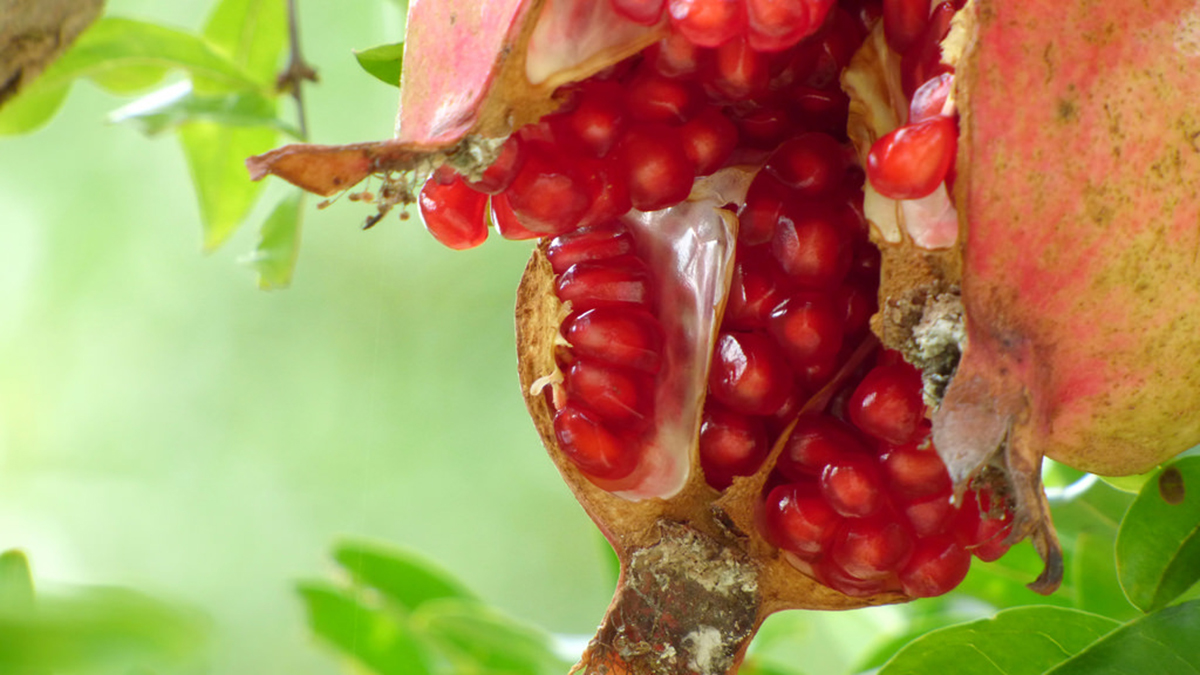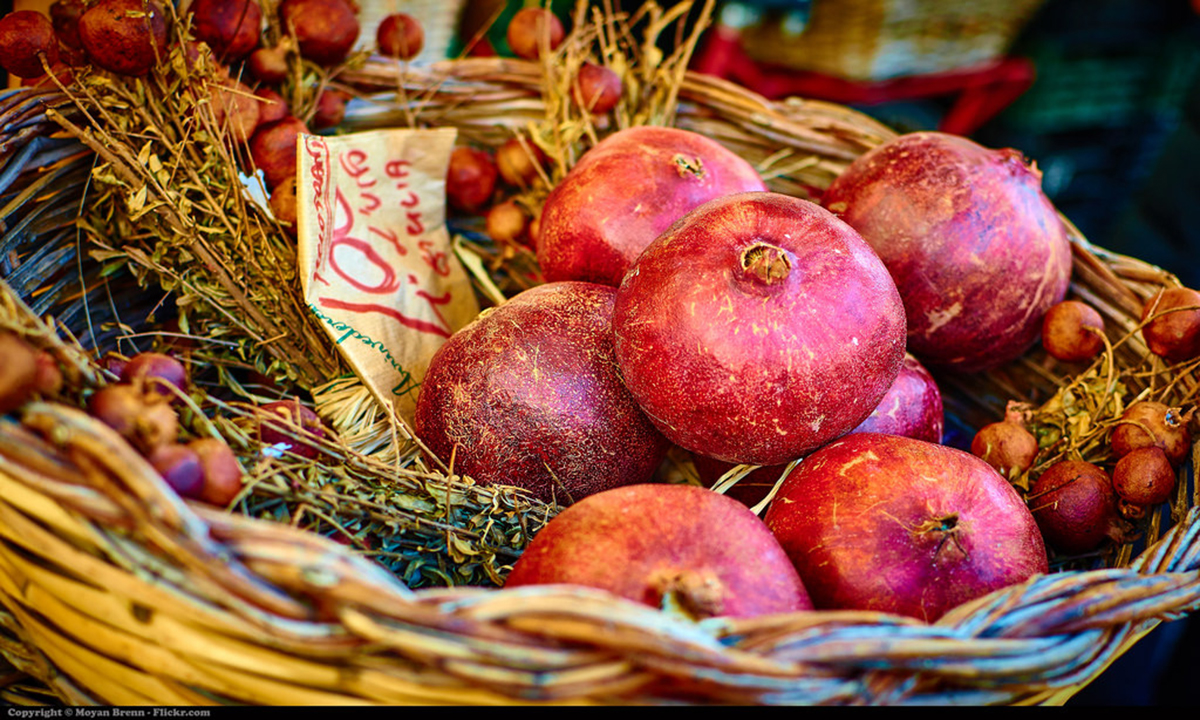Pomegranate — or Punica Granatum — is a fruit that originated in the Middle East, and it has been around for thousands of years. In Medieval Latin, the word means seeded apple. The fruit has been mentioned in Babylonian texts, Homeric Hymns and almost every religious text in the world. They appear in Greek Mythology and Egyptian papyrus documents. Historians have discovered that pomegranate has been in use for over 6000 years. Ancient people used its peel and blossom to make red dye. It is considered to be Garden of Eden fruit which biblical scouts brought to prove to Moses fertility of the land.

Nutritional Value
To help you understand pomegranate better, we bring you some information on its nutrition.
A serving size of 100g contains:
- Vitamin C – 6.1mg (17% of daily value)
- Total Carbohydrates – 19g
- Dietary Fiber – 4g (16% of daily value)
- Sugars – 14g
- Protein – 2g
- 83 Calories
It seems like pomegranates are everywhere these days. Doctors and researchers are doing everything to extol pomegranate virtues – from free-radicals fighting antioxidants – to combating heart issues and cancer. This dark-red fruit is also a good source of fiber. It contains vitamins A, E and K, potassium, plenty of iron and antioxidants, particularly ellagic acid, tannins and anthocyanins. These can be found in many fruit and vegetables, but fresh pomegranate contains the extremely high amounts.
Effects On Cancer
One study found that drinking a glass of pomegranate juice every day can slow down, to a certain extent, the progress of prostate cancer. Also, a study from 2013 found that giving men pomegranate extract tablets prior to cancerous prostate tissue removal surgery reduces the amount of tissue required to be removed. These were both well-conducted studies, but more work is needed to prove the findings.
Can Pomegranate Cure Dementia?
When brain cells become inflamed, they lose ability to function normally. These sick cells – which will eventually die off – cause irreversible brain changes. Alzheimer's disease is the sixth leading death cause in America, and even though plenty of research has been done on it, the cure is still unknown. Two substances in pomegranates are most responsible for its health benefits, and they are Punicalagins and Punicic Acid. These substances can't cure dementia, but can prevent it and slow down its further development.
Punicalagin – This polyphenol isolated from pomegranate juice can inhibit inflammation of microglia, tiny brain and spinal cord cells. Inflammations can destruct more and more brain cells which eventually worsens the symptoms of Alzheimer's and Parkinson's disease.
READ Pomegranate: an Antioxidant Bomb and a Super Fruit
Punicic Acid – Omega 5 fatty acid, extremely effective in cell rejuvenation and proliferation. It is characteristic only of this fruit and considerably delays the aging process.
Pomegranate And Arthritis
It is said that there are foods able to reduce symptoms of arthritis with their anti-inflammatory effects, but there is no evidence to support these claims. Even if it was not the case, they are natural foods and hence a safe replacement for drugs. Half of all patients with osteoarthritis use foods like green tea, turmeric or pomegranate to battle their condition. It may not be proven effective, but they don't do harm and can offer additional health benefits. One research paper from 2013 has proven that pomegranate and its derivatives can improve bone health and decrease inflammation in mice. However, the study hasn't been conducted on humans, so we cannot be sure whether it would be helpful.
More On Pomegranate's Superfood Properties
Besides previously discussed perks, pomegranate's jewel-like seeds can be used to ease stomach upsets, hot flashes in menopausal women, conjunctivitis, lower the blood pressure, lower cholesterol, stimulate the immune system and battle flu and inflammations. And not only edible parts give these benefits.
Do you eat tasty arils and throw rest of the pomegranate away? Well, you probably answered yes, but you need to stop! None of it should be discarded! The peel can be used to make tea which improves intestinal health. It is also useful for mouth and throat ulcers or wounds.

Ease Stomach Problems With Pomegranate Tea
Peel-water ratio should be 1:20. Use 10g of pomegranate’s peel and 200ml of water. Cover and leave it for 25 minutes. Preparation of the tea is same for all mentioned health conditions; however, the application is different. Drink half the cup and if you start feeling better within 10 minutes, you probably have salmonella or typhoid. Drink the rest in three hours.
For more serious conditions, tea should be consumed throughout the whole day in equal parts, about 25ml. First 25ml should be consumed first thing in the morning, and last part directly before bed. Consume this drink every other day! This amount is enough to cure any condition, but if you feel like you need more, pause for seven days and continue consuming it in the same way. It is extremely important to use the right ratio of peel and water, or tea could cause dizziness and nausea. Do not drink alcohol during the treatment!
In this way, you are destroying pathogenic gastrointestinal cells without doing harm to healthy ones.
READ Herbal Treatment for Gastrointestinal Disorders
Conclusion
The health benefits of pomegranate cannot be denied. It is definitely a superfruit. You should not rely on its ability to cure or slow down an advanced disease, but it can be used as prevention. You know the old one: Better safe than sorry. There is a reason the pomegranate plant has been around for at least six millennia.
It is important to mention one more thing. Because of its high levels of carbohydrates and sugar, it is not recommended for people with diabetes. Make sure you have your doctor's approval before you decide to indulge in this, for many people, it is an extremely healthy treat. Like in any food, the best health benefits can be seen when consumed in moderation.
- Photo courtesy of aigle_dore: www.flickr.com/photos/aigle_dore/16658926017/
- Photo courtesy of conifer: www.flickr.com/photos/conifer/15336981839/
- Photo courtesy of conifer: www.flickr.com/photos/conifer/15336981839/
- www.ncbi.nlm.nih.gov/pubmed/11052704
- www.ncbi.nlm.nih.gov/pubmed/16818701
- authoritynutrition.com/12-proven-benefits-of-pomegranate/
- www.hud.ac.uk/news/2014/august/researchonpomegranatedrugtostemalzheimersandparkinsons.php
- link.springer.com/article/10.1007/s00394-013-0615-6
- www.naturalnews.com/046637_pomegranates_alzheimers_Parkinsons.html
- nutritiondata.self.com/facts/fruits-and-fruit-juices/2038/2


Your thoughts on this